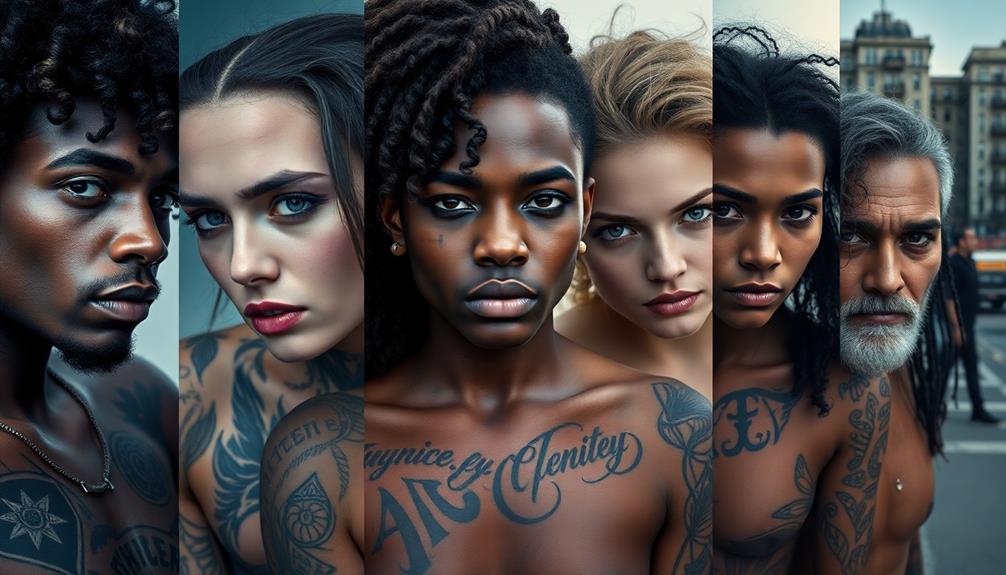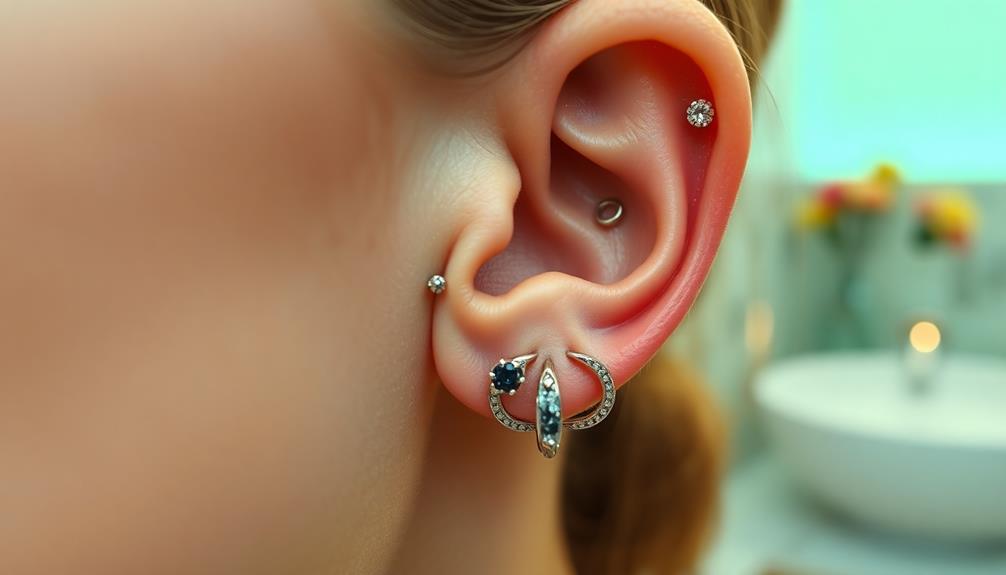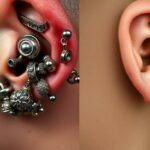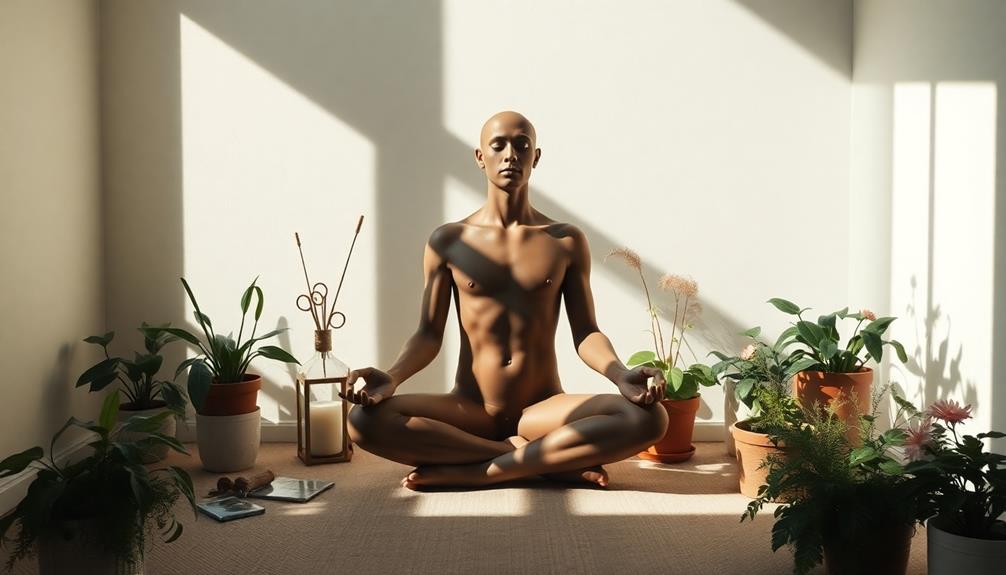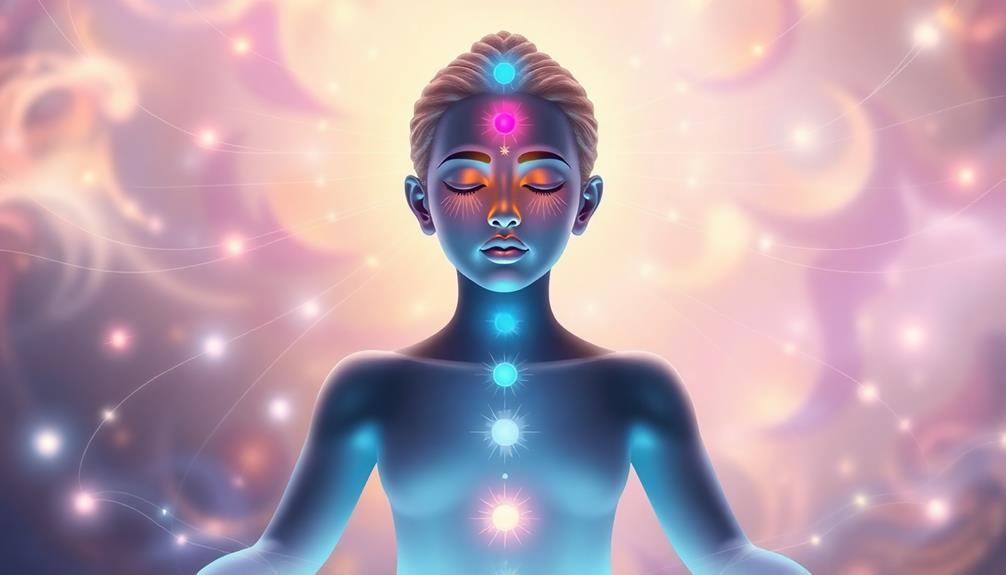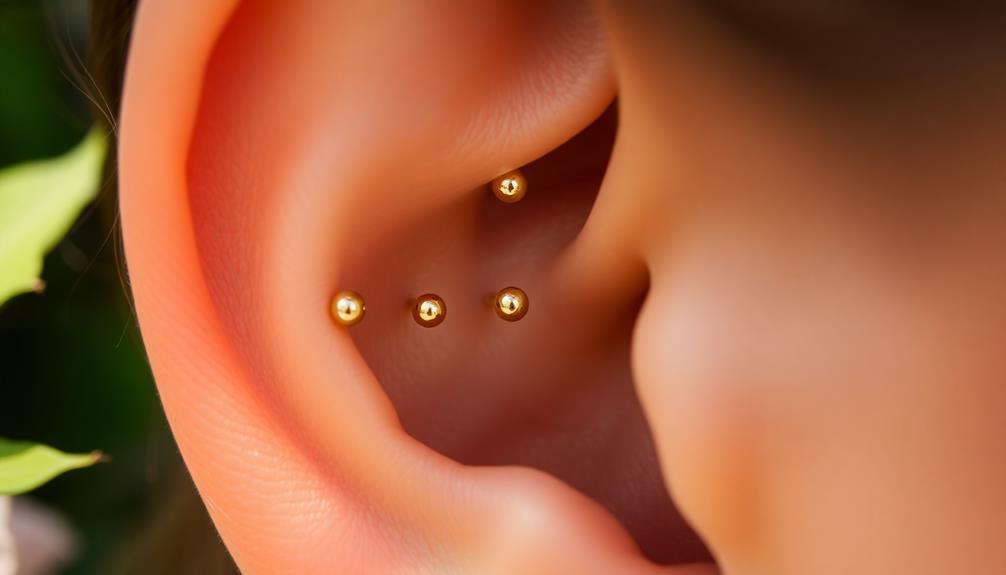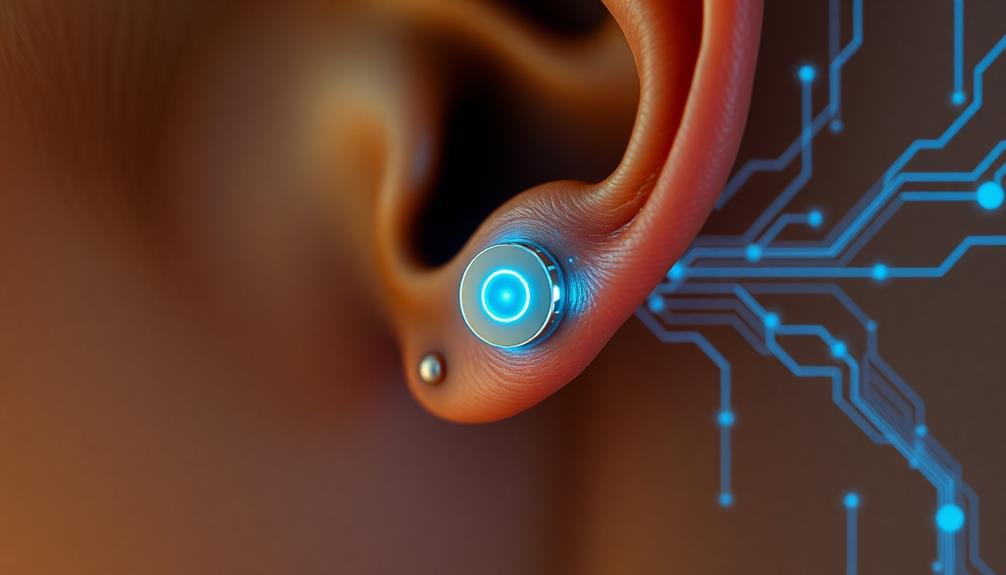Body modification can deeply impact your psychology. It often enhances your self-esteem and boosts confidence, serving as a powerful form of self-expression. You might find that these modifications allow you to affirm your identity and create a personal narrative. However, societal pressures can also drive you to alter your body, sometimes leading to regret or dissatisfaction. The stigma surrounding modifications may complicate your acceptance journey, affecting relationships and self-image. Understanding these dynamics can help you navigate your feelings about body modification effectively, opening the door to insights you might not have considered yet.
Key Takeaways
- Body modifications can enhance self-confidence and self-perception, often leading to a stronger sense of personal identity.
- Individuals with body modifications typically exhibit a heightened need for uniqueness, reflecting their distinct identities.
- Tattoos and other modifications can serve as coping mechanisms for trauma, commemorating significant life events and promoting healing.
- Engagement in body modification practices fosters deeper connections to personal and cultural identity, impacting overall well-being.
- Psychological benefits include empowerment and increased body ownership, challenging societal norms and improving self-esteem.
Historical Context of Body Modification
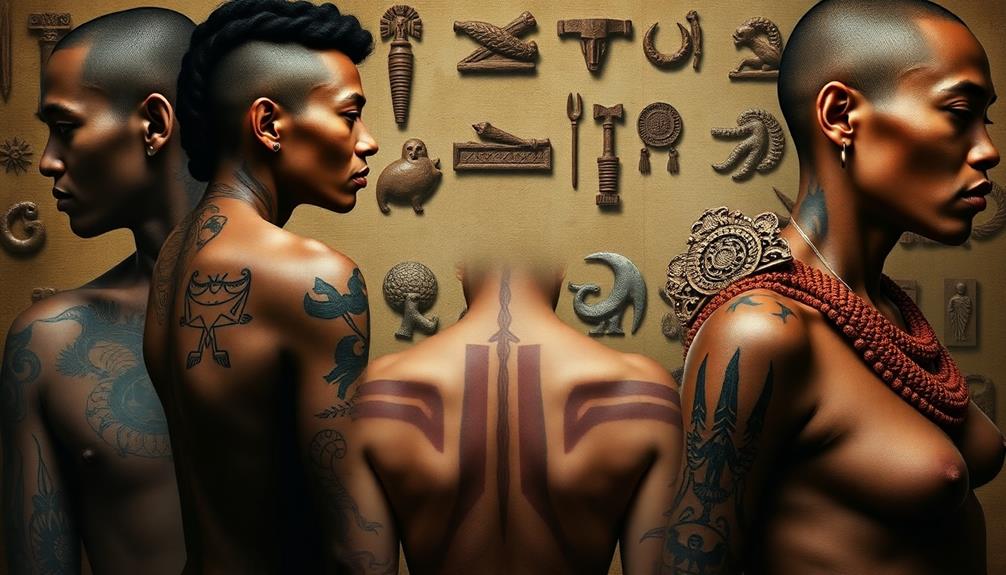
Body modification has deep historical roots that stretch back thousands of years, revealing a rich tapestry of cultural practices and societal norms. You might be surprised to learn that evidence of body modifications like tattooing can be traced to ancient civilizations, such as those found in the Olduvai Gorge and in the remains of Ötzi the Iceman. These practices often reflected the body image ideals of their time, influenced heavily by social conventions.
In various cultures, modifications like foot-binding in China and corseting in Victorian Western societies aimed to conform women to specific beauty standards, highlighting the significant health implications tied to these practices.
The introduction of the electric tattoo machine in the 19th century revolutionized body modifications, making them more accessible and popular in Western societies.
Throughout history, the acceptance of body modifications has fluctuated, often mirroring cultural and political changes. Military influences increased visibility but also led to stigmatization after the World Wars.
Cultural Perspectives on Modifications
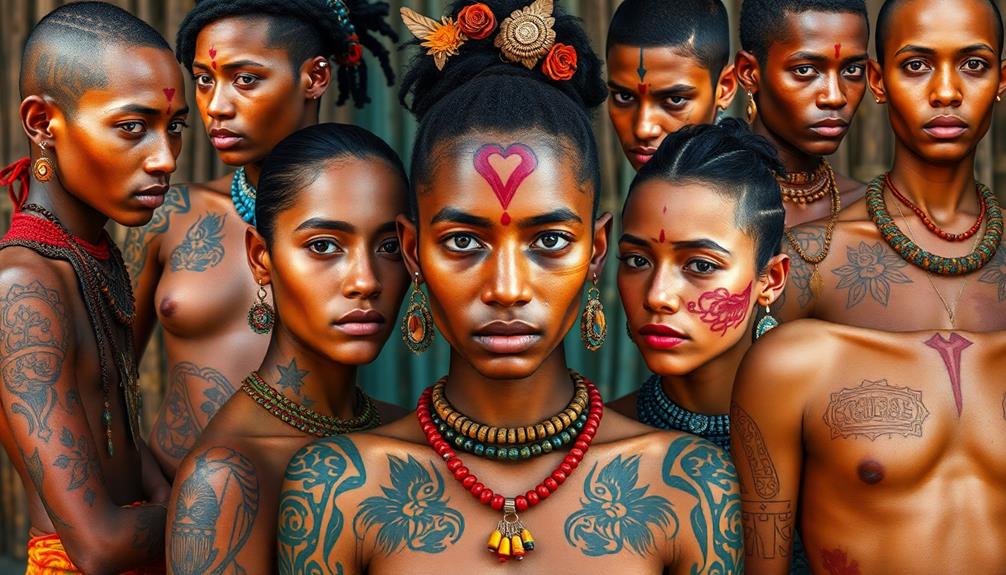
How do cultural perspectives shape the ways people view body modifications? Across the globe, body mods reflect unique ideals of beauty and identity, often tied to social status. Different cultures celebrate diverse practices, viewing them as rites of passage or symbols of group membership. For instance, henna tattoos in Southeast Asia and neck elongation in Thailand showcase how modifications can signify cultural pride and belonging.
| Cultural Practice | Perspective on Body Mods |
|---|---|
| Tattooing in Western Cultures | Individual expression, trendy |
| Foot-binding in China | Social status, beauty ideal |
| Corseting in Victorian Era | Aesthetic norms over health |
| Male and female circumcision | Rite of passage, cultural identity |
| Henna tattooing | Celebration, tradition |
Historical practices like foot-binding illustrate how aesthetics have often trumped health concerns. As body mods gain popularity in Western societies, especially among younger generations, they represent a shift towards individualistic expressions. However, this rise also sparks discussions on cultural appropriation, urging sensitivity and awareness when adopting practices from other cultures. Understanding these cultural perspectives can help navigate the complex landscape of body modifications today.
Psychological Motivations for Modifying
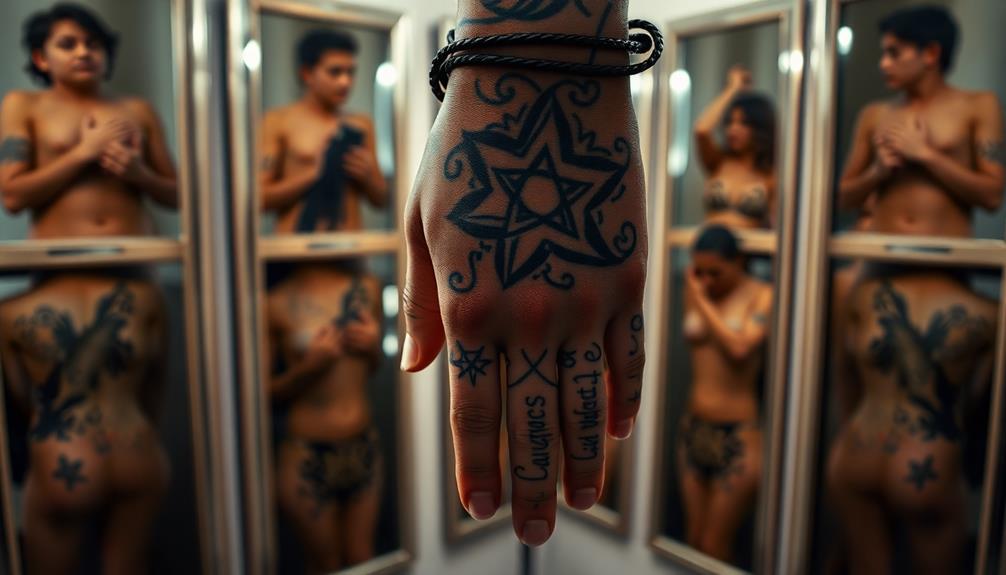
When you consider body modifications, think about how they can serve as a powerful form of self-expression and identity.
Many people modify their bodies to enhance their appearance or to showcase their unique personality.
This drive for aesthetic appeal and individuality plays an essential role in the choices you make about your body.
Identity and Self-Expression
Many people find that body modifications serve as a powerful outlet for self-expression and identity formation. When you choose to get a tattoo, piercing, or any other alteration, you're conveying your beliefs, values, and personal narrative. Research shows that individuals with body modifications tend to have a higher need for uniqueness, meaning you might be driven to stand out and assert your individuality.
Additionally, engaging in self-expression through body art can be akin to the thoughtful process behind heartwarming gift boxes, where each choice reflects personal significance and connection.
For many, body modifications aren't just about aesthetics; they can hold deep spiritual significance or serve as a means of coping with trauma. As you undergo these transformations, you might experience personal growth, further solidifying your identity. Approximately 10% of Americans are tattooed, and many use this art to commemorate significant life events or showcase creativity.
The psychological impact of body modification can be profound. You might feel empowered and gain improved self-esteem as these changes foster a sense of ownership and control over your body.
In embracing body modifications, you're not just altering your appearance; you're expressing who you're and embracing your unique identity.
Aesthetic Enhancement Motivation
Aesthetic enhancement drives many individuals to pursue body modifications, as they often seek to elevate their physical allure and boost their sexual appeal. Many people get tattoos or piercings, believing these alterations enhance their attractiveness, with practices like tongue and nipple piercings thought to improve sexual experiences. About 10% of Americans sport tattoos, often placed to accentuate curves or conceal imperfections, demonstrating a desire to enhance their overall appearance.
Additionally, understanding the importance of navigating life's tiny pitfalls can empower individuals to make informed decisions about their self-image and body modifications.
Body modifications are increasingly accepted as valid methods for improving attractiveness, thanks to a societal shift that embraces visible modifications among all genders. This growing acceptance reflects a broader understanding of aesthetic enhancement as a means of self-esteem improvement. Research shows that these alterations can positively impact your self-image, allowing you to express your unique identity and personal style.
Ultimately, the psychological effects of aesthetic enhancement through body modifications can lead to feelings of empowerment and self-ownership. By making these changes, many individuals report increased confidence and a greater sense of well-being, affirming that body modifications serve not just as aesthetic choices, but as significant contributors to self-esteem and personal satisfaction.
Impact on Self-Identity and Confidence

When you engage in body modifications like tattoos or piercings, you often find a powerful way to express your individuality and creativity.
These transformations can greatly boost your confidence, allowing you to embrace your uniqueness.
As you explore these forms of self-expression, you might notice a positive shift in how you view yourself and your identity.
Self-Expression Through Modifications
How do body modifications shape your sense of self? Engaging in body modification practices, like tattoos and piercings, allows you to express your individuality and showcase your personal narrative. With around 10% of Americans sporting tattoos, these modifications become powerful symbols of self-expression, connecting you to significant life events or personal struggles. They can act as healing rituals, reinforcing your identity and marking your journey.
The psychological impact of these modifications is profound. As you embrace body art, you often experience increased feelings of empowerment and creativity, fostering a deeper connection to your personal and cultural identity. This connection can enhance your sense of ownership over your body and appearance, leading to greater self-awareness.
Moreover, individuals with body modifications typically show a heightened need for uniqueness, reflecting a strong desire for individuality. This drive for self-expression through your body not only shapes how you see yourself but also influences how others perceive you.
Confidence Boosting Effects
Body modifications, such as tattoos and piercings, greatly boost your confidence and self-identity. Many individuals report that after getting a tattoo or piercing, they experience a surge in self-esteem and a stronger sense of body ownership. For about 10% of Americans, tattoos serve as powerful expressions of personal identity, enhancing overall self-confidence.
Psychological studies indicate that body modifications can act as a form of healing. You might choose a tattoo to commemorate a notable life event or to symbolize overcoming personal struggles, which can greatly enhance your self-worth.
When you engage in body modification, you often feel empowered, as these changes affirm your individuality and challenge societal norms. The desire for uniqueness plays an essential role in this process.
Research shows that those with a higher need for uniqueness tend to have more body modifications, reflecting their commitment to expressing distinct identities and enhancing self-confidence. Ultimately, these modifications can transform how you perceive yourself, leading to a more profound sense of body ownership and an overall increase in confidence.
Body Image and Societal Pressure
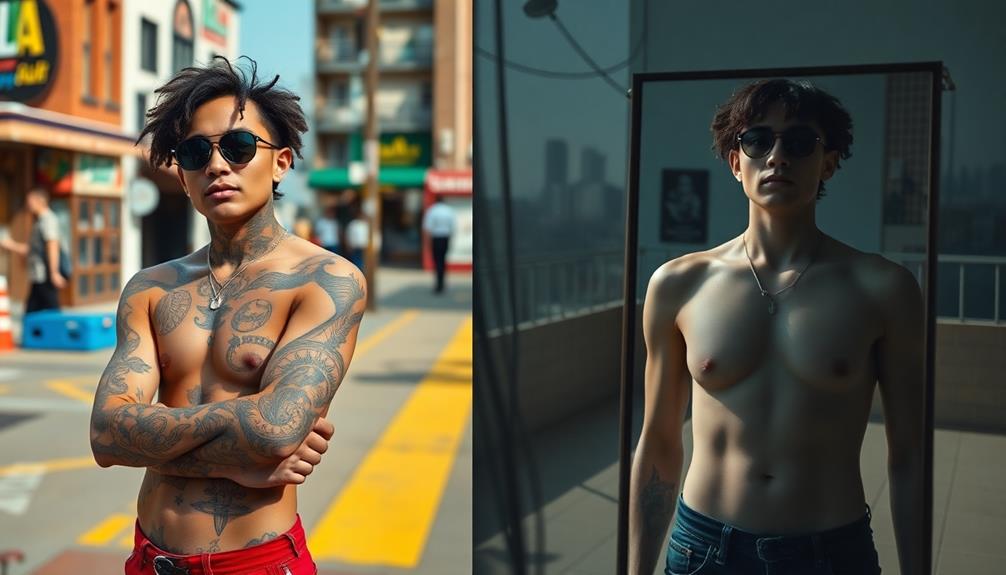
Maneuvering through the complexities of body image can be intimidating, especially with societal pressures constantly shaping our perceptions of beauty. You might feel that your worth is tied to your appearance, leading to anxiety about your weight and looks. Thinness is often idolized, creating a standard that can drive unhealthy behaviors like extreme dieting or excessive body modifications.
Curiously, about 60% of women and 42% of men have body piercings, signifying a shift in how society views body modifications as expressions of identity. Additionally, the luxurious interior designs of celebrities often reflect their personal styles, which can influence public perceptions of beauty and self-presentation.
However, if you struggle with low self-esteem, you may seek body modifications hoping to enhance your body image. Unfortunately, this can sometimes lead to regret and a distorted self-view if your changes don't align with societal expectations.
Moreover, the cultural narrative around body image often fosters stigma against those with visible modifications. This stigma can complicate your journey toward acceptance, making it harder to feel confident in your choices.
Ultimately, while body modifications can be empowering, they're also influenced by societal pressures that can distort your self-image and sense of belonging.
Health Risks Associated With Modifications
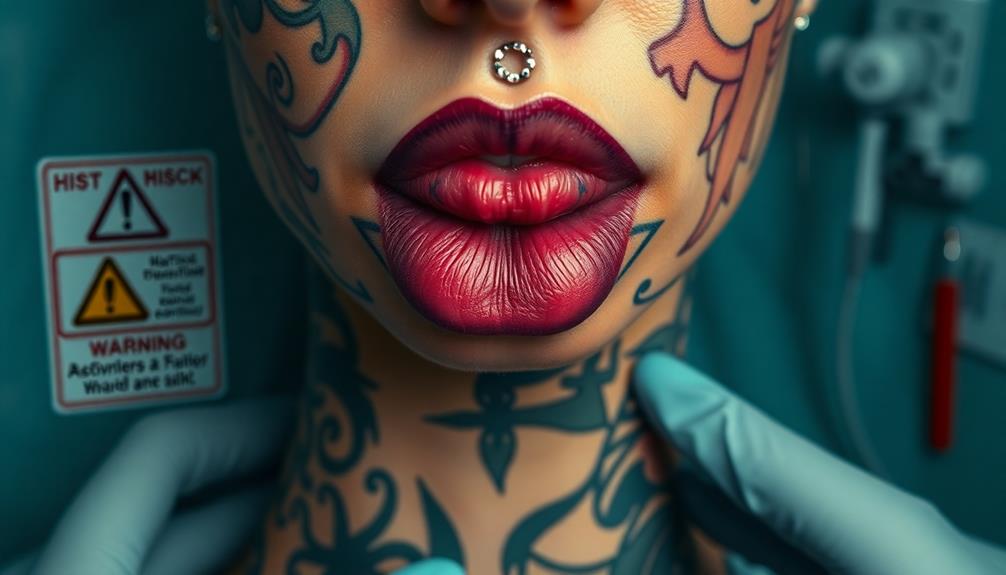
When considering body modifications, it's vital to be aware of the potential health risks involved. While these changes can be empowering for some, they can also pose significant dangers to your well-being.
Engaging in self-reflection and establishing clear, achievable goals for your modifications can help mitigate some risks, allowing for a more mindful approach to personal transformation.
Here are four key health risks to keep in mind:
- Skin Damage: Modifications like tanning can lead to severe skin damage, premature wrinkling, and increase your risk of skin cancer due to excessive UV exposure. This condition is often referred to as "tanorexia."
- Surgical Complications: If you opt for surgical procedures, you might face complications such as infections, scarring, or dissatisfaction with the results. Thorough research and professional consultation are significant.
- Psychological Addiction: The endorphin release during modifications can lead to psychological addiction, driving compulsive behavior and increased risk-taking.
- Mental Health Issues: Excessive alterations may mask underlying mental health issues, highlighting struggles with self-esteem or identity that require careful consideration.
It's important to recognize these feelings and seek support, as seeking guidance can be beneficial in managing these challenges.
Acceptance and Stigma in Society
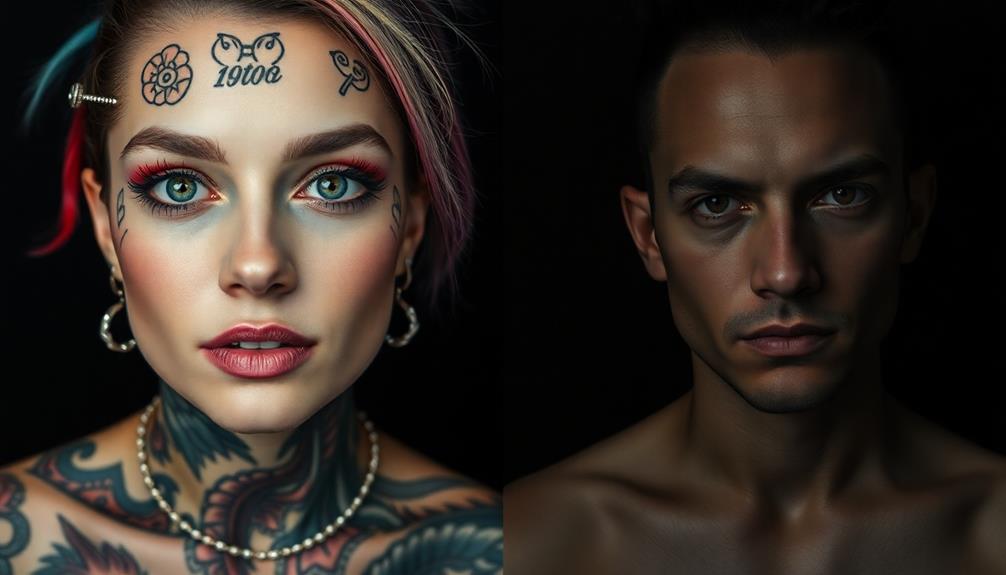
Maneuvering societal perceptions of body modifications can be challenging, especially given the historical stigma attached to them. People often associate body modifications with lower social classes, criminality, and mental illness, leading to discrimination against those with visible modifications. However, the tides are slowly changing.
In recent years, media representation and body positivity movements have played vital roles in fostering acceptance. Younger generations are embracing body modifications, showcasing a shift in cultural attitudes. Yet, the stigma still lingers, often affecting workplace policies and personal interactions.
Here's a comparison of societal attitudes towards body modifications over time:
| Aspect | Historical View |
|---|---|
| Stigma | Associated with criminality & madness |
| Military Influence | Increased visibility, then suppression |
| Current Acceptance | Growing acceptance, especially among youth |
| Workplace Policies | Vary notably, reflecting ongoing debates |
Despite the progress, acceptance isn't universal, and challenges remain. Understanding these dynamics is essential for anyone maneuvering the complexities of body modifications in today's society. The journey toward acceptance continues, but every step helps reduce stigma.
Trends in Body Modification Practices
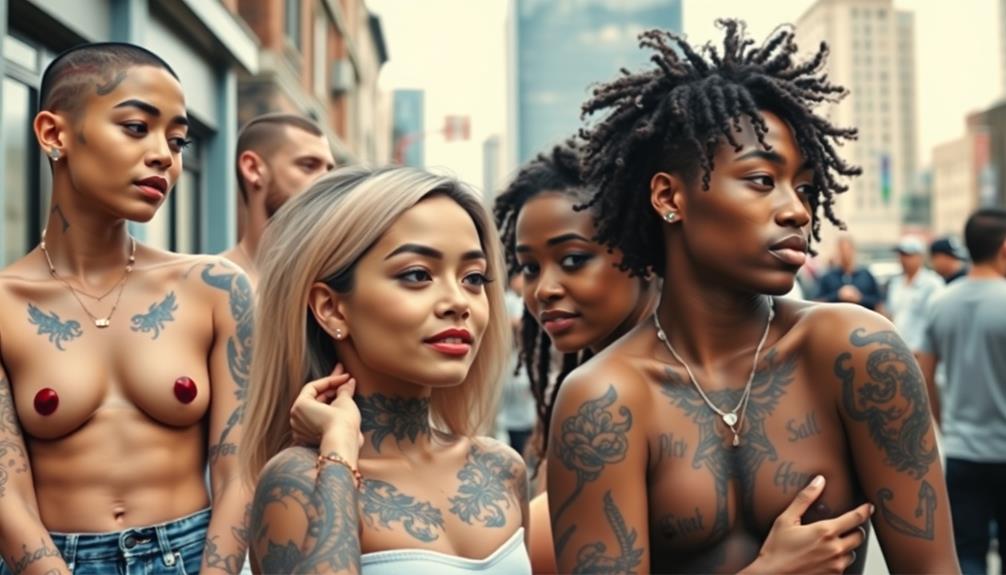
As acceptance of body modifications grows, it's evident that trends in these practices are evolving rapidly. You might notice a significant rise in popularity for tattoos and piercings, especially among younger generations. This cultural shift is influenced by several factors, including social media and changing beauty ideals.
Here are some key trends you should be aware of:
- Increased Visibility: Social media platforms are showcasing diverse body modification practices, leading to greater acceptance.
- Gender Equality in Modifications: More men are seeking cosmetic procedures, with a 20% rise since 2000, indicating broader acceptance of body modification across genders.
- Focus on Aesthetics: The tanning industry, valued at $5 billion annually, reflects a growing trend towards body modifications aimed at enhancing physical appearance.
- Tattoos and Piercings: Approximately 10% of Americans have tattoos, while around 60% of women and 42% of men have piercings, showing the widespread appeal of these body modifications.
These trends highlight the evolving landscape of body modification, emphasizing both personal expression and societal acceptance.
Future Directions in Body Modification Research
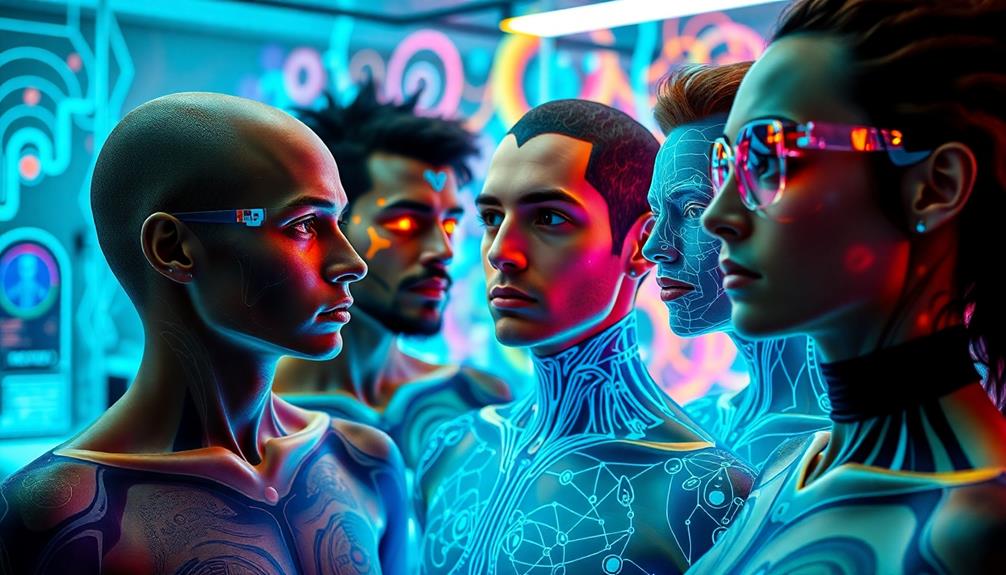
The evolving landscape of body modification research promises to deepen our understanding of the complex interplay between individual identity and societal norms. Researchers are increasingly focusing on how factors like race, gender, and socioeconomic status influence motivations and perceptions around body modifications.
| Research Focus | Key Considerations |
|---|---|
| Intersectionality | Examining race, gender, and class impacts |
| Cultural Globalization | Effects of global beauty standards on local practices |
| Psychological Effects | Long-term satisfaction vs. regret |
| Role of Social Media | Influence of online communities on perceptions |
Additionally, the role of social media is essential in shaping trends and perceptions. It affects how communities normalize diverse body aesthetics and can impact individuals' psychological motivations, particularly in relation to Body Dysmorphic Disorder. Future studies will employ new methodologies to explore these aspects, capturing the nuanced experiences of individuals who modify their bodies. By doing so, researchers hope to understand how societal acceptance and personal identity intertwine over time, ultimately enriching the dialogue around body modification.
Frequently Asked Questions
What Are the Psychological Effects of Tattoos?
Tattoos can boost your self-esteem and sense of identity. They often symbolize personal milestones, helping you express individuality. However, societal perceptions might lead to feelings of regret or embarrassment for some. It's a complex journey.
What Are the Effects of Body Modification?
When you adorn your skin with ink or piercings, it's like crafting your personal canvas. Body modification can boost self-esteem, foster a sense of uniqueness, but impulsive choices might lead to regret or societal judgment.
What Is the Psychological Impact of Negative Body Image?
Negative body image can distort your self-perception, leading to low self-esteem and anxiety. You might find yourself engaging in unhealthy behaviors, desperately seeking validation, while those feelings of inadequacy continue to amplify and overwhelm you.
What Is the Psychology Behind Piercings?
Have you ever wondered why people choose piercings? It's often about expressing individuality, boosting self-confidence, and seeking a connection to community. Yet, the choice can also stir societal judgment and personal reflection.
Conclusion
In exploring body modification, you uncover a complex web of psychological influences and societal pressures. While some seek empowerment through their choices, others grapple with stigma and self-image issues. The truth lies in understanding that these modifications often reflect deeper desires for identity and acceptance. Ultimately, embracing the diversity of these experiences can foster compassion and challenge societal norms, encouraging a more inclusive view of self-expression that celebrates individuality rather than conformity.
Hi, my name is Danielle, and I’m an author for piercings-body.com. I have a passion for writing and love to share my knowledge on all things body piercing-related. I’m also a huge advocate for safe body modification practices and believe everyone should be able to make informed decisions about their bodies. When I’m not writing or blogging, I enjoy spending time with my family and friends, practicing yoga, and exploring new places.

